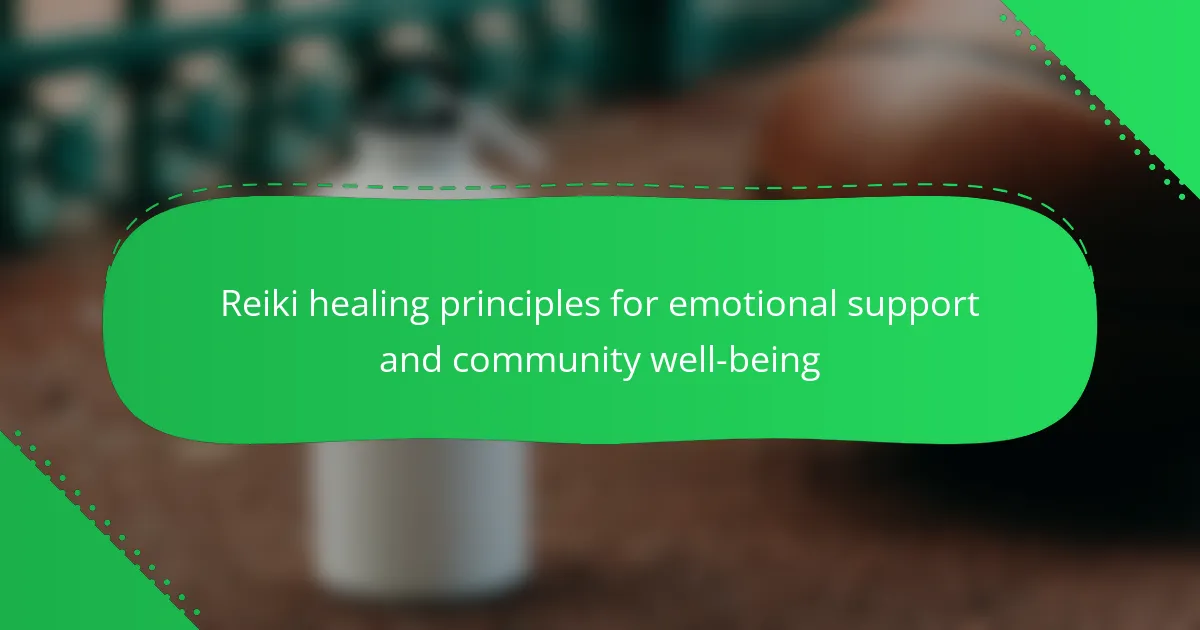Reiki healing principles provide essential emotional support and enhance community well-being. These practices promote relaxation, reduce stress, and foster connections among participants. Group sessions create a shared healing environment, improving emotional resilience and interpersonal relationships. Integrating Reiki into community health programs can empower individuals and cultivate a culture of well-being.
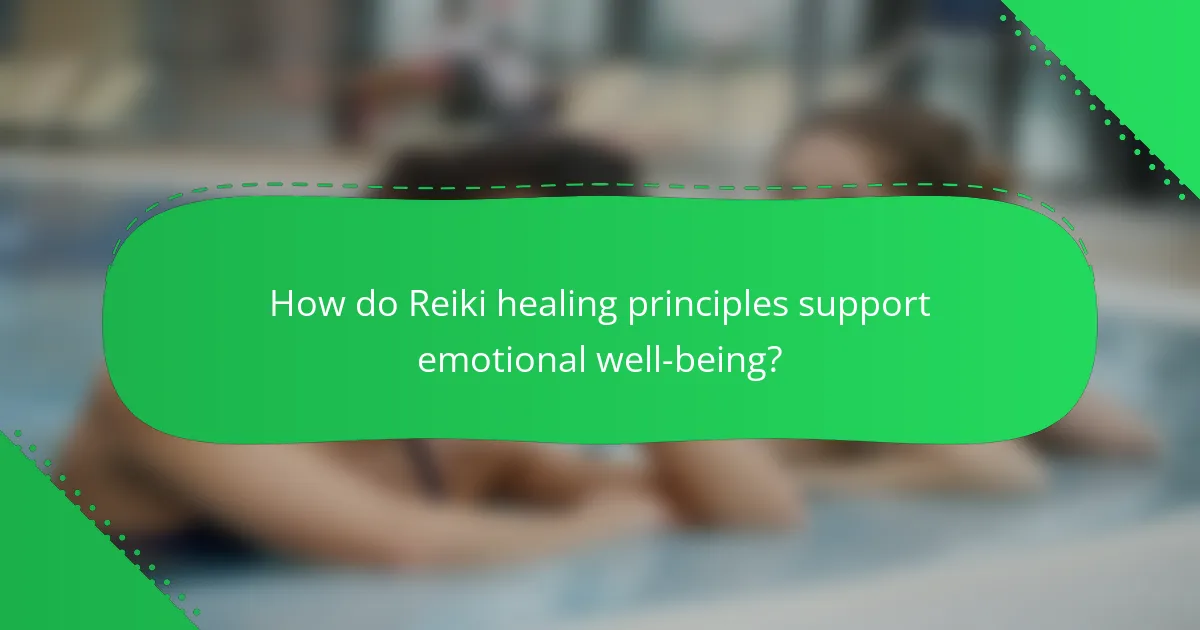
How do Reiki healing principles support emotional well-being?
Reiki healing principles enhance emotional well-being by promoting relaxation, reducing stress, and fostering a sense of community. Practitioners use energy transfer to balance emotions, which can lead to improved mental clarity and emotional stability. Studies indicate that regular Reiki sessions can decrease anxiety levels significantly. Additionally, the communal aspect of Reiki fosters connections among participants, enhancing social support and emotional resilience.
What are the core principles of Reiki?
Reiki healing principles focus on promoting emotional support and community well-being through energy balance. Key principles include the importance of intention, compassion, and interconnectedness. These principles foster a supportive environment, enhancing emotional resilience and community bonds. Practicing Reiki encourages mindfulness and self-awareness, allowing individuals to tap into their inner peace. As a result, communities can experience collective healing and improved mental health.
How does Reiki facilitate emotional release?
Reiki facilitates emotional release by promoting relaxation and reducing stress. This healing practice encourages the flow of energy, helping individuals confront and process emotional blockages. As a result, this leads to a greater sense of peace and emotional clarity. Reiki sessions often create a safe space for individuals to explore their feelings, allowing for a deeper emotional connection and community well-being. The unique attribute of Reiki is its ability to address emotional issues without the need for verbal communication, enabling profound shifts in emotional states.
Why is energy balance important for emotional health?
Energy balance is crucial for emotional health as it influences mood and stress levels. Reiki healing principles promote emotional support and community well-being by fostering a state of balance. This energetic alignment can help individuals manage their emotions more effectively. As a result, participants often experience reduced anxiety and improved overall mental health. Engaging in community Reiki sessions strengthens social bonds, enhancing emotional resilience collectively.
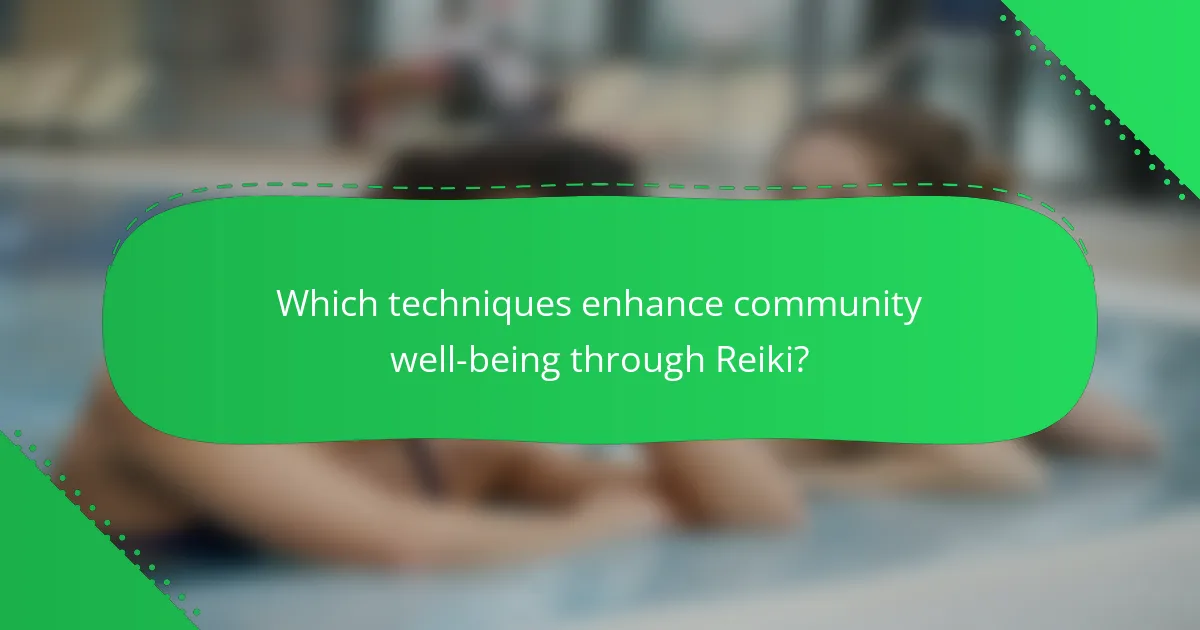
Which techniques enhance community well-being through Reiki?
Reiki techniques enhance community well-being by fostering emotional support, reducing stress, and promoting healing. These practices encourage connection and empathy among participants.
Group Reiki sessions create a shared healing environment, allowing participants to experience collective energy. This enhances emotional resilience and strengthens community bonds.
Meditative practices in Reiki facilitate mindfulness, which can improve emotional regulation. As a result, individuals within the community may experience enhanced interpersonal relationships and a supportive atmosphere.
Workshops that teach Reiki techniques empower community members to practice self-care. This promotes a culture of well-being and encourages individuals to support one another in their healing journeys.
How can group Reiki sessions foster connection?
Group Reiki sessions foster connection by creating a shared space for emotional healing and support. Participants experience a collective energy that enhances feelings of belonging and trust. This communal aspect allows individuals to connect deeply, share experiences, and provide mutual support, reinforcing community well-being. The shared practice of Reiki promotes understanding and empathy, essential for building lasting relationships.
What role does Reiki play in community healing initiatives?
Reiki plays a significant role in community healing initiatives by promoting emotional support and enhancing well-being. This holistic practice fosters connection among individuals, creating a supportive environment. Reiki sessions can reduce stress and anxiety, facilitating emotional release and healing.
Communities often incorporate Reiki into wellness programs, workshops, and group sessions. These initiatives encourage participants to share experiences, fostering a sense of belonging. As a result, individuals report improved mental clarity and emotional resilience.
The unique attribute of Reiki is its focus on energy healing, which can be tailored to individual needs. Participants often experience profound relaxation, leading to a collective sense of peace. This rare quality makes Reiki a valuable tool for community healing efforts.
In summary, Reiki contributes to community well-being by providing emotional support, fostering connections, and enhancing overall mental health. Its principles align with the goals of community healing initiatives, making it an effective resource.
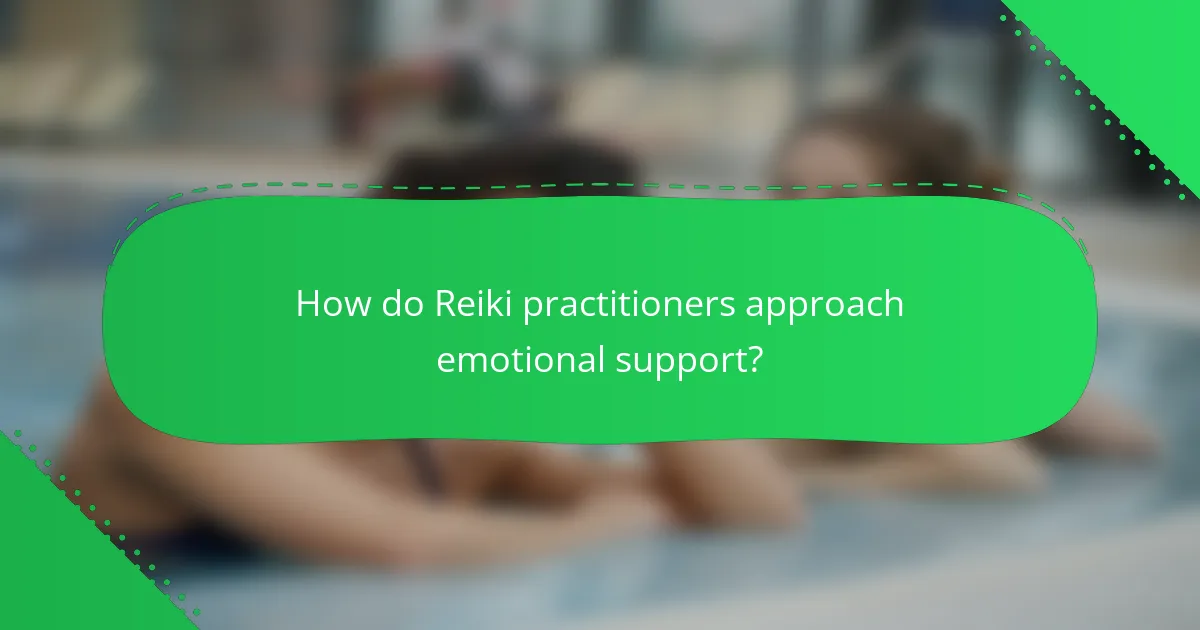
How do Reiki practitioners approach emotional support?
Reiki practitioners approach emotional support by fostering a safe, compassionate environment. They utilize energy healing techniques to help individuals release emotional blockages and promote inner peace. Practitioners often incorporate guided meditations and affirmations to enhance emotional resilience. Community well-being is emphasized through group healing sessions, creating a supportive network that encourages shared healing experiences. This collective approach nurtures emotional connections and promotes overall mental health.
What training do Reiki practitioners undergo for emotional healing?
Reiki practitioners undergo extensive training focused on energy healing and emotional support. This training typically includes understanding the Reiki principles, mastering hand positions, and learning to channel energy effectively.
Practitioners often complete levels of training, starting from Reiki I, which emphasizes self-healing and basic techniques, to advanced levels that cover emotional healing and distance healing. Each level enhances their ability to support community well-being through emotional release and stress reduction.
Additionally, many practitioners incorporate meditation and mindfulness practices into their training. These techniques promote emotional balance and resilience, further enhancing their effectiveness in facilitating healing for others.
The unique attribute of Reiki training is its emphasis on intuitive development, allowing practitioners to sense and address emotional blockages in clients. This holistic approach fosters a supportive environment for emotional healing.
Which ethical considerations are crucial for practitioners?
Practitioners must prioritize client autonomy, confidentiality, and informed consent in Reiki healing. These ethical considerations ensure emotional support and foster community well-being. Respecting individual boundaries builds trust and encourages effective healing. Practitioners should also engage in continuous self-reflection to maintain ethical standards.
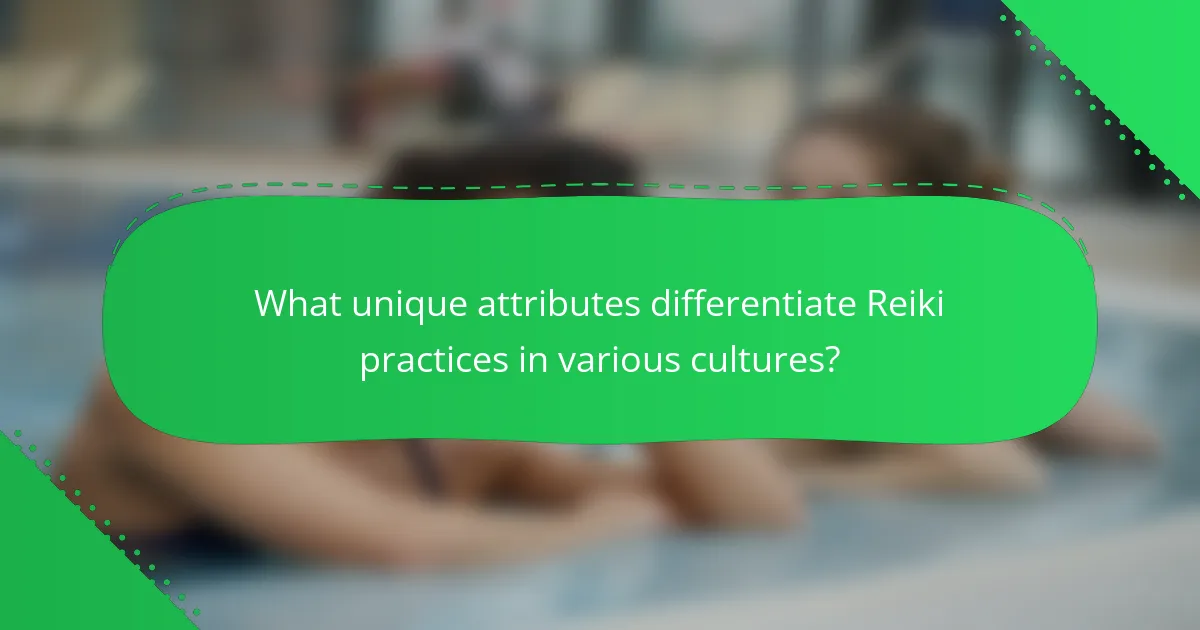
What unique attributes differentiate Reiki practices in various cultures?
Reiki practices differ across cultures through unique attributes such as techniques, cultural beliefs, and community integration. For instance, Japanese Reiki emphasizes spiritual growth and meditation, while Western approaches often focus on physical healing and stress relief. Additionally, some cultures incorporate local traditions and rituals, enhancing the emotional support aspect of Reiki. These variations contribute to community well-being by fostering diverse healing practices that resonate with different cultural backgrounds.
How does Japanese Reiki differ from Western approaches?
Japanese Reiki emphasizes a holistic approach that integrates spiritual and emotional healing, while Western Reiki often focuses on physical ailments. Japanese practices prioritize meditation and energy flow, fostering deep emotional support and community well-being. Western approaches may incorporate more structured techniques, sometimes losing the traditional emphasis on connection and intuition. Both forms aim to promote healing, but their methods and philosophies differ significantly.
Which cultural adaptations have emerged in global Reiki practices?
Cultural adaptations in global Reiki practices emphasize emotional support and community well-being. Regional interpretations of Reiki have emerged, integrating local beliefs and traditions. For instance, in Japan, practitioners often focus on mindfulness and meditation, enhancing emotional resilience. In Western cultures, Reiki is frequently combined with holistic health approaches, promoting community healing events. Unique adaptations, like animal Reiki, highlight a rare attribute of the practice, expanding its reach. These variations enhance the core principles of Reiki, fostering a sense of community and emotional support across diverse cultures.
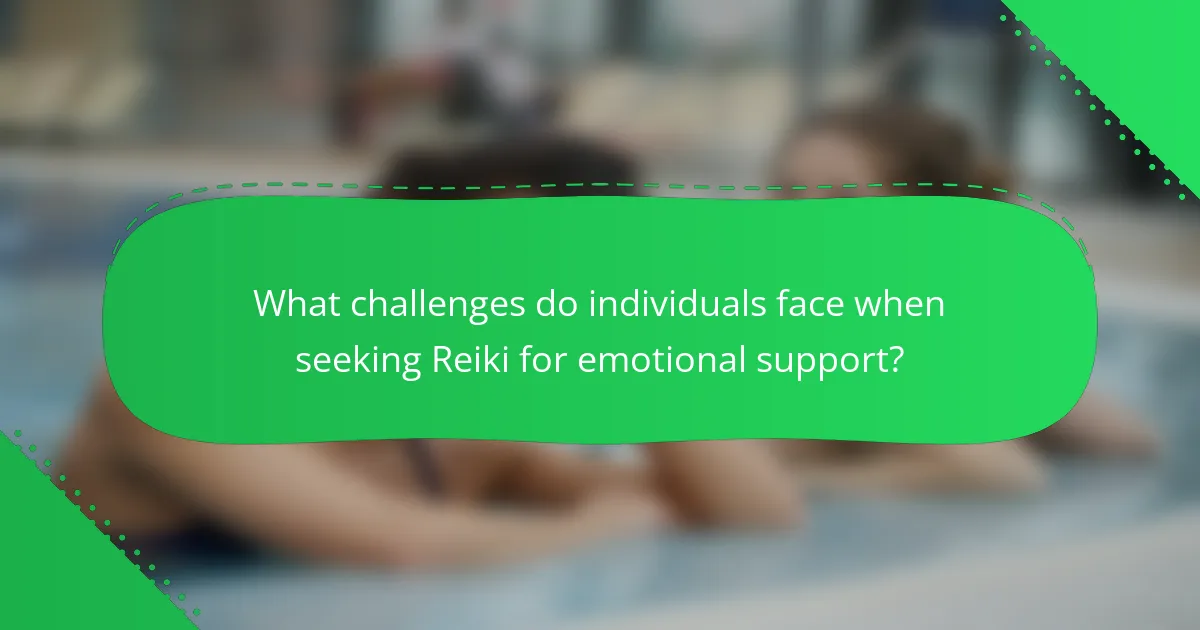
What challenges do individuals face when seeking Reiki for emotional support?
Individuals seeking Reiki for emotional support often face challenges such as skepticism, accessibility, and misalignment of expectations. Skepticism about Reiki’s effectiveness can hinder acceptance and willingness to engage. Accessibility issues arise from the limited availability of qualified practitioners, especially in rural areas. Misalignment of expectations can occur when individuals anticipate immediate results, while Reiki often promotes gradual emotional healing. Additionally, some may struggle with understanding the principles of Reiki, which can create confusion about the process and its benefits.
How can misconceptions about Reiki be addressed?
Misconceptions about Reiki can be addressed through education and community engagement. Providing accurate information about Reiki’s principles fosters understanding and acceptance. Workshops and seminars can clarify its role in emotional support and community well-being. Sharing testimonials from individuals who experienced positive outcomes enhances credibility. Creating a supportive environment encourages open discussions, allowing people to express doubts and receive informed responses.
What barriers exist in accessing Reiki services?
Barriers to accessing Reiki services include cost, lack of awareness, and limited availability. Many individuals may not know about Reiki’s benefits for emotional support and community well-being. Additionally, practitioners may not be easily accessible in certain areas, limiting options for those seeking help.
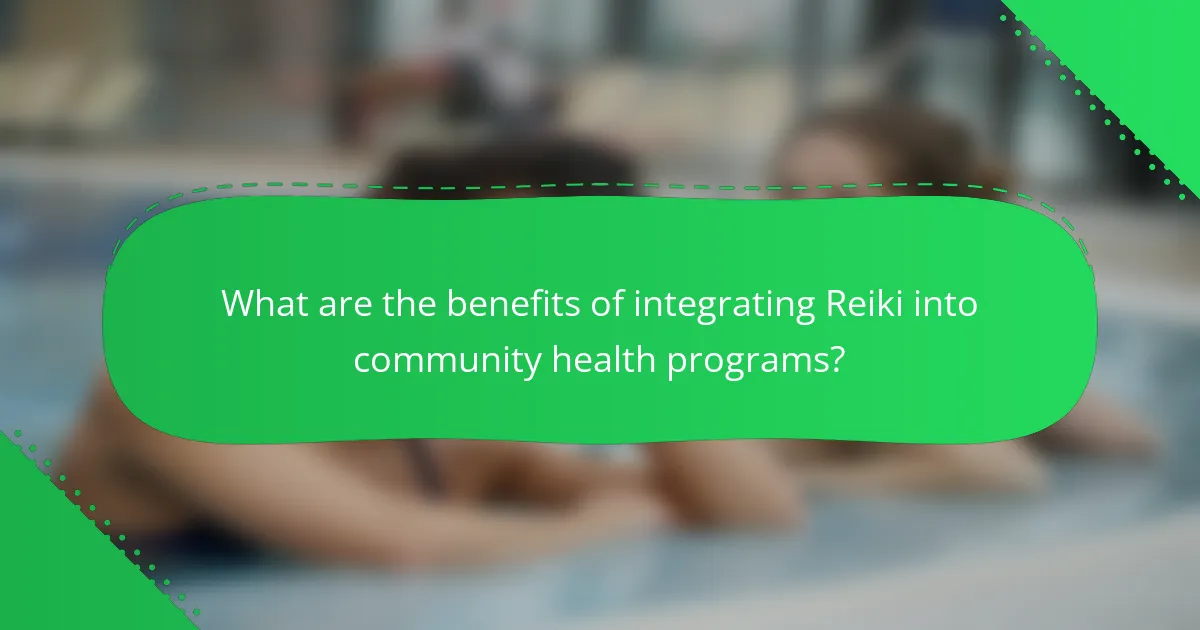
What are the benefits of integrating Reiki into community health programs?
Integrating Reiki into community health programs enhances emotional support and promotes overall well-being. Reiki fosters relaxation, reduces stress, and encourages a sense of connection among participants. This holistic approach can improve mental health outcomes by addressing emotional distress and facilitating healing. Community members often report increased feelings of peace and empowerment, contributing to a healthier environment. Additionally, Reiki can be easily incorporated into existing health initiatives, making it a versatile tool for community wellness.
How can Reiki complement traditional therapy methods?
Reiki can effectively complement traditional therapy methods by enhancing emotional support and promoting community well-being. Reiki healing principles focus on energy balance, which can alleviate stress and anxiety, fostering a sense of peace. This holistic approach encourages deeper emotional connections, facilitating a supportive environment. Studies indicate that integrating Reiki with conventional therapies can improve overall treatment outcomes, highlighting its role in enhancing mental health.
What evidence supports the effectiveness of Reiki in community settings?
Research indicates that Reiki is effective in community settings for emotional support and well-being. Studies show that participants experience reduced anxiety and improved mood after Reiki sessions. For instance, a community program reported a 60% increase in participants’ self-reported emotional well-being. Additionally, Reiki fosters a sense of connection among individuals, promoting community cohesion. Evidence from qualitative studies highlights personal testimonials of enhanced emotional resilience, demonstrating Reiki’s unique attribute of promoting holistic healing. As a result, Reiki serves as a valuable tool for enhancing community mental health initiatives.
What best practices should be followed when implementing Reiki in communities?
Implementing Reiki in communities requires adherence to best practices that enhance emotional support and well-being. First, ensure trained practitioners lead sessions to maintain authenticity. Second, create a safe, welcoming environment to encourage participation. Third, incorporate community feedback to tailor sessions to specific needs. Fourth, promote regular practice to build trust and consistency. Lastly, integrate Reiki with other wellness initiatives for a holistic approach.
